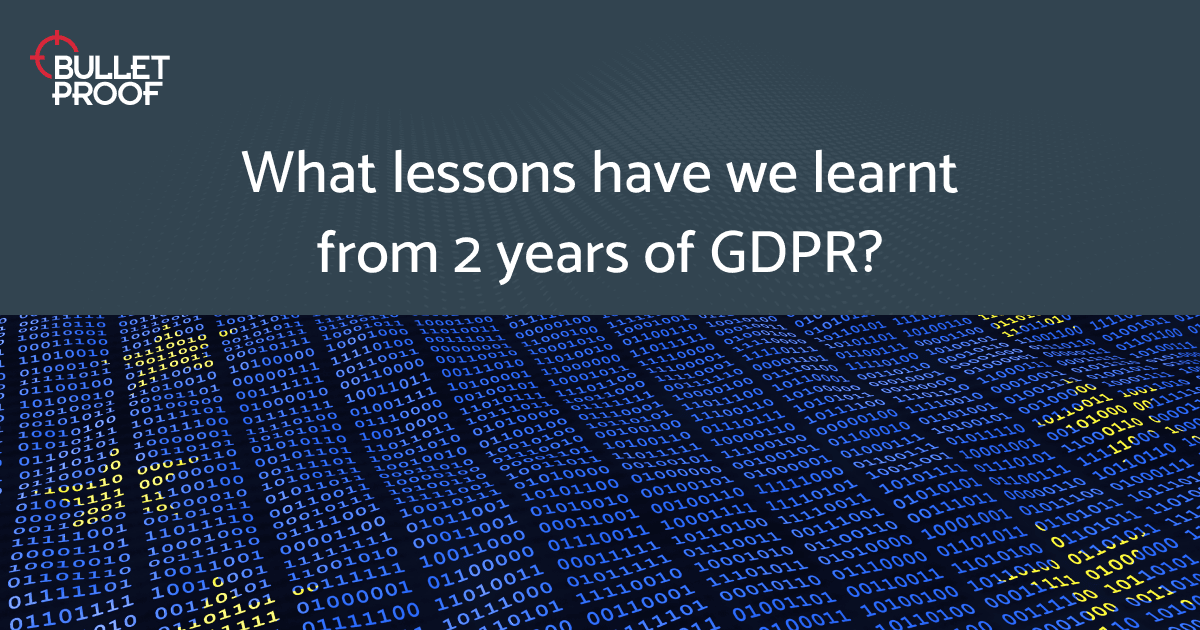Data: A New Direction What is it & what is being proposed?
Find out more about Data: A New Direction, a consultation from HM Government on proposed reforms designed to streamline Data Protection under the GDPR.

Introduction
In 2018, the implementation of the GDPR signalled a seismic shift in how businesses target, collect and store personal data. As individuals entrust businesses with their personal data more than ever before, the GDPR has ensured that the right to privacy for individuals is protected through its regulation.
Not since the result of Brexit, and the GDPR ceasing to protect the rights and freedoms of UK Citizens (since 1st Jan 2021), has there been significant changes to the GDPR. However, John Edwards, the UK's newly appointed Information Commissioner, has wasted no time in setting the scene for wholesale reform of the UK's post-Brexit approach to data protection, by launching the Data: A New Direction consultation .
In this blog, we discuss responses to the UK Government's Data: A New Direction consultation, and some of the key changes proposed for the UK's new Data Reform Bill. We also look at changes to accountability, when the reforms could take place, and how the proposed reforms could impact businesses.
Share this Article
The government's proposals are aimed at streamlining data protection and reducing the burden on businesses.
What is the new proposal?
On 17th June 2022, the UK Government published its response to its consultation, Data: A New Direction. The consultation was initially launched on 10th September 2021. It proposed a variety of wide-ranging reforms to aid the government in its ambitions of turning the UK into the most appealing global data marketplace.
The proposals in the response are arranged into 30 headings across 5 chapters, titled:
Reducing barriers to responsible innovation
Reducing burdens on businesses and delivering better outcomes for people
Boosting trade and reducing barriers to data flows
Delivering better public services
Reform of the Information Commissioner's Office (ICO)
The government's proposals are aimed at streamlining data protection and reducing the burden on businesses while still trying to protect individual's rights and freedoms. Some of the most pertinent changes that have been proposed include, introducing reforms to accountability and introducing privacy management programmes, removing Data Protection Officers (DPOs), and axing mandatory Data Protection Impacts Assessments (DPIAs) and Records of Processing Activities (ROPAs).

Accountability reform - privacy management programmes (PMP)
The principle of accountability defines that organisations are responsible for complying with the UK GDPR and must be able to demonstrate their compliance. However, under the newly proposed reforms, the government plans to proceed with the requirement for organisations to implement risk-based 'privacy management programmes' (PMPs). This will allow organisations to integrate current accountability mechanisms as elements of a holistic approach to accountability. This means organisations that are currently compliant with the UK GDPR wouldn't need to significantly change their approach to be compliant with the new requirements.
Respondents that opposed this proposal expressed concerns that the introduction of privacy management programmes would cause confusion about how to comply. The counter argument is that privacy management programmes will reduce the administrative burden on businesses and the 'box-ticking' approach to compliance.
The principle of accountability is key for privacy management programmes. The responsible use of personal data will continue to be at the heart of the GDPR accountability framework under the new regime. The government believes that privacy management programmes will place greater emphasis on the key principles at the core of accountability, such as organisational responsibility, risk management, transparency, and training and awareness of staff. It is hoped that continuous monitoring and evaluation will lead to an improvement in data protection management within organisations. How or if this will force UK businesses to change their approach to GDPR data protection, or whether these programmes will affect compliance frameworks that businesses already have in place, will depend solely on how any new legislation reads.
In response to the Data: A New Direction consultation, the government wants to create a more agile approach to GDPR compliance.
 Suggested data protection reform proposals
Suggested data protection reform proposals
In response to the Data: A New Direction consultation, the government wants to create a more agile approach to GDPR compliance, maintaining high governance standards while reducing the burden on businesses and their resources. Here, we highlight additional key proposals that have been suggested for the Data Reform Bill, that may impact businesses:
Legitimate Interest Assessments (LIAs) will be axed, and a few (very few) defined processing activities will be exempt from any form of formal review. Moving forward, where Legitimate Interest is to be used as a lawful basis for processing personal data, organisations will need to conduct a 'balancing test', weighing-up any risks posed by the processing to individuals' rights and freedoms. How this will differ from an LIA, we are yet to see.
Data Protection Impact Assessments (DPIAs) will no longer be necessary as prescribed in the UK GDPR. Instead, organisations will be given greater flexibility in how they meet the requirement of identifying and managing risks. What is being proposed in place of DPIAs is a more holistic approach, that organisations must have a framework in place for the identification, assessment and mitigation of data protection risks across the organisation.
Records of Processing Activities (ROPA) - despite most respondents disagreeing with the proposal of eliminating the requirement for ROPAs, HM Government is planning to press ahead with its removal, stating, “Privacy management programmes will still require organisations to document the purposes of processing, but in a way which is more tailored to the organisation.” How this requirement will differ from the UK GDPR's Article 30, is yet to be defined.
Data Protection Officer (DPO) - the proposed abolition of the DPO was also met with disagreement from most of the respondents to the consultation. As it stands, Article 37 of the UK GDPR mandates the appointing of a DPO to very few UK companies, and practically no small businesses need a DPO by law. Currently, organisations who either do not need or choose not to appoint a DPO must delegate data protection responsibilities to an individual with appropriate seniority and experience. HM Government claims that the “… new requirement to appoint a senior responsible individual will shift the emphasis to ensure data protection is established at a senior level to embed an organisation-wide culture of data protection.” It could be argued that this is already defined in Articles 37 to 39 of the UK GDPR and what is being proposed is simply a change of title.
There have been suggestions that organisations will be able, once again, to charge a fee for the handling of Data Subject Access Requests (DSARs). Conversely, there have been indications that a cap will be imposed on reasonable charges levied for responding to DSARs which are deemed manifestly unfounded, excessive or vexatious. HM Government's response to the consultation clearly states that there is no planned change to the current rules - DSAR requests will remain (mostly) free-of-charge and, where a fee is reasonable, it will not be capped by law.
HM Government's proposals for data protection reform touch on many more areas than are mentioned here, including:
The use of Artificial Intelligence (AI) in data management
Data sharing in research environments
Removal of consent requirements for some third-party cookies
A reform of the Information Commissioner's Office (ICO)
Electronic marketing by charities
The use of derogations
The introduction of certification schemes
Rest assured that the EU will be keeping a close eye on the proposed PMP reforms and, no doubt, expressing their concerns where necessary.
One major factor which needs to be considered in these proposals are the UK's Adequacy Decision, allowing the free flow of personal data between the UK and the European Economic Union (EEA). This decision is crucial for UK businesses to operate seamlessly on a European and a Global scale, without the need for individual agreements with every connected EU-based entity. To maintain the Adequacy Decision, the UK must ensure that the standards and protection applied to GDPR data transfers and EU Citizens' data processing in the UK are not lowered. We await a reaction from Europe with bated breath.
The response to the consultation raises one very interesting question: is the government listening?
When could these proposals take effect?
The view that great changes and cuts to the GDPR are afoot are currently wide of the mark, as no time has been allocated for the introduction of the Data Reform Bill. Assuming its introduction in early 2023 and, with readings and committee stages required in both the House of Commons and Lords, it is possible that we will not see any new UK data protection laws before mid-2024, if at all.
A new direction?
Finally, the response to the consultation raises one very interesting question: is the government listening? There is more than one instance of changes being proposed where many respondents to the consultation have disagreed with the government's plans. The drawbacks to the proposed changes are that they suggest existing GDPR processes are redundant. Furthermore, business begin to fall under greater pressure to comply to any new processes that are introduced. Some may argue that this shows that the Department for Digital Culture Media and Sport - who are ultimately responsible for the changes, are out of touch with the realities of how GDPR works on the ground.
Key takeaways
Responses to HM Government's Data: A New Direction consultation has led to new changes being proposed for the Data Reform Bill
UK government's new proposals are designed to reform data protection law, reduce the burden on businesses, and strike a better balance between protecting individuals without obstructing appropriate data use
Suggested reforms include: introducing privacy management programmes, and the removal of the need for DPOs, DPIAs, LIAs, ROPAs and DSARs
Despite the HM Government suggesting these changes will reduce the burden on businesses, it is unclear on how the proposals will work in practice

Meet your GDPR & data protection obligations
Our GDPR consultants are certified and experienced data protection experts. Find out more about how we support organisations across a range of industry sectors, successfully guiding them through the complex responsibilities of GDPR and data protection.
Learn moreRelated resources
Get a quote today
If you are interested in our services, get a free, no obligation quote today by filling out the form below.













